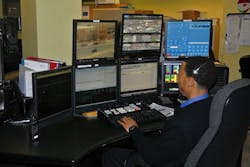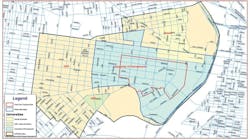Penn strengthens campus security by reviving its surrounding neighborhood
In 1996, the University of Pennsylvania’s sprawling campus in Philadelphia was in the grip of an unprecedented crime wave.
While other universities chose to wall themselves off from their surrounding neighborhoods, Penn’s administrators, led by then-President Judith Rodin, decided that such a strategy wouldn’t work for their 280-acre campus. “The notion back then was, ‘If West Philly goes down, Penn would go down with it,’” says University Architect David Hollenberg, AIA.
So Penn doubled down on its investment in public safety. More important, it launched initiatives that addressed quality of life and security issues as well as housing and economic development in the surrounding West Philadelphia neighborhood.
For more on university security, read BD+C's Special Report: "How security is influencing campus design and construction"
The results have been striking. Crime in the 2.5-square-mile Penn Patrol Zone—which stretches from 30th to 43rd Streets, and from Market to Baltimore Streets—was down 49% from 1997 through 2012, says Maureen Rush, Penn’s Vice President for Public Safety and Superintendent of Penn Police. The last fatal shooting close to campus occurred last April, outside a bar unaffiliated with the university. For eight consecutive years, Security magazine has ranked Penn first among colleges and universities for public safety.
One bonus, says Rush, is that “all this produced community relations that Penn did not have before.” The campus holds monthly town meetings that are regularly attended by 60–70 local residents and business owners.
In a recent interview with BD+C, Rush, Hollenberg, and Michael Dausch, Executive Director of Design and Construction Management for Penn’s Facilities and Real Estate Services department, recounted the steps Penn took to secure its campus.
In 1996, the university hired 19 new police officers, installed 102 new blue light phones, and integrated its policing strategy with that of the Philadelphia police force. (The Daily Pennsylvanian reports that Penn spent $7 million on these actions alone.) Penn’s 180-building campus now has over 500 emergency phones and 116 sworn officers, according to its 2014 Annual Security and First Safety Report, which covers 2011 to 2013. Its PennComm Communications Center processes over 106,000 calls a year, including Walking Escort requests.
The university beefed up its security presence in 1996 by contracting with Allied Barton Security, which stations officers around the campus. (There are now more than 550 guards on site.) Penn created a buffer zone beyond the campus’s patrolled area, which is supported by safety “ambassadors” who escort students and faculty to their cars and homes. This University City District includes security and communications partnerships with nearby Drexel University and the University of the Sciences.
But policing alone could not be the only answer to Penn’s crime problems, says Rush. Equally critical was the introduction of its West Philadelphia Initiatives, which focused on making surrounding neighborhoods safer and better places in which to live and work.
Those initiatives, says Hollenberg, included mortgage assistance programs for graduate students and faculty; the construction of a K-8 school, which Penn continues to support financially with a per-student donation of about $1,300 a year; and a $140 million investment in commercial development that drew retail stores and groceries to the community.
Penn is still improving its campus security. Rush says the university is in the midst of “Operation Building Safe,” a university-wide communications system that includes “virtual concierges”—a video camera/intercom combination that allows Public Safety to remotely verify the identity of a person seeking entry to a building.
Rush’s department also oversees “Penn Ready,” an emergency preparedness and notification program that includes SMS and email messages, and 29 discrete sirens placed around campus for alerts. The ultimate goal: emergency lockdown capability, via Public Safety control of every door on campus. “We’re moving toward that,” she says.

